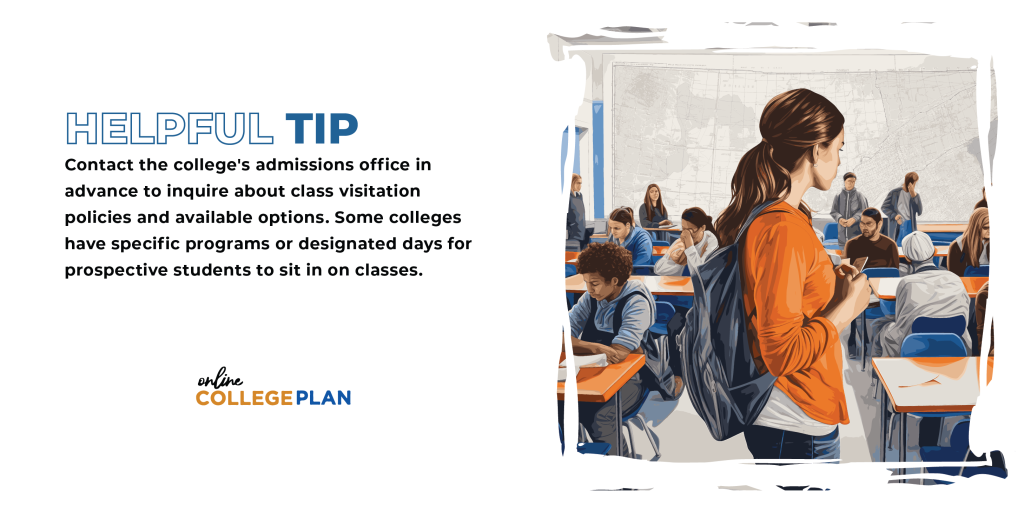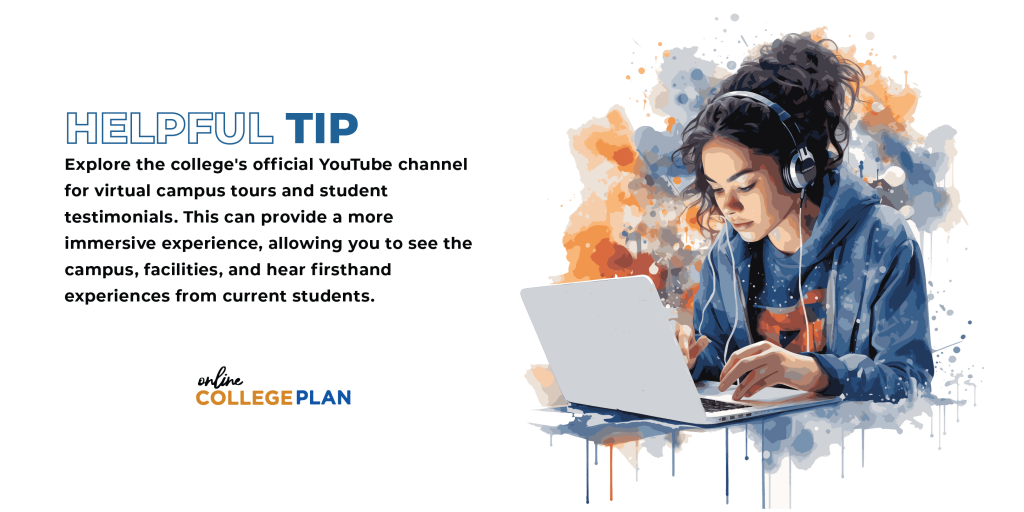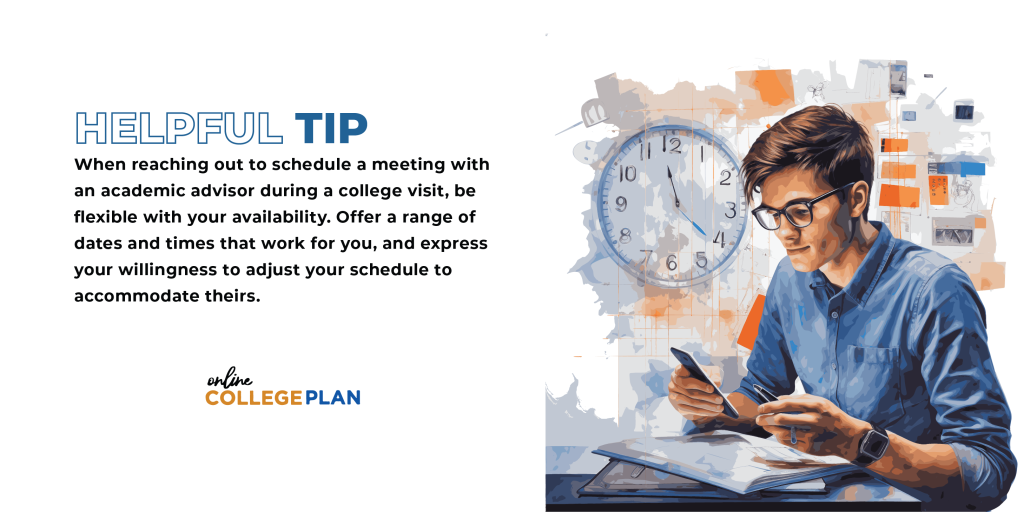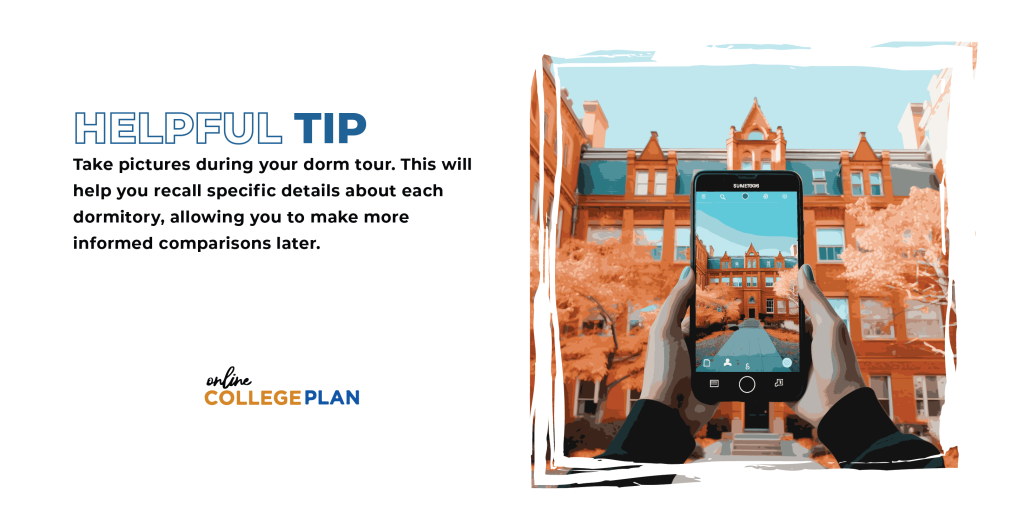Find your degree
Selecting the perfect college can be an exciting and overwhelming for high school students. A campus visit is a crucial step in this process. Many students begin having college visits during their junior year of high school. These visits provide an opportunity to get a feel for the college environment and gather essential information. We created this campus visit checklist to break down key aspects of your visit. We included some helpful campus visit tips that will ensure a well-prepared and insightful experience.
#1. Researching the Campus in Advance
Preparing for college tours involves researching each campus. Before setting foot on campus, it’s crucial to conduct research to make the most of your visit. You can start by using online resources available at your fingertips. Check out the wealth of information on the college’s official website. In fact, you can often find virtual tours providing a glimpse of campus life! Is there a certain time of year that is best to visit? Some college campuses are known for their beautiful spring flowers or their wintery snowfall. Explore social media platforms to get a feel for the college community. Familiarize yourself with the campus layout and the school’s academic offerings. You will also want to be aware of any recent developments or news that may impact your visit.
Another valuable step in the research process is to connect with current students. You can use social media platforms or student forums to engage with students who are already immersed in campus life. You can ask about their journey or inquire about their favorite spots on campus. They may even have some tips for future students! Building these connections can help you gather authentic and invaluable information.
Once you’ve completed these preliminary activities, it’s time to plan your visit schedule strategically. Identify the key areas you want to explore on campus, including:
- academic buildings
- recreational spaces
- dormitories
With a clear agenda, you can feel confident that your visit covers all aspects of interest and maximizes your time on campus. Consider reaching out to academic departments. Schedule meetings with professors or advisors. This will allow for personalized discussions about your potential major and academic goals. You should also plan to attend any campus events or tours that align with your interests. This will provide a well-rounded view of life at the college.
Researching the campus in advance sets the foundation for a successful and informative visit. You can make the most of your time on campus when you:
- Leverage online resources
- Connect with current students
- Strategically plan your visit schedule
This proactive approach enhances your understanding of the college. It also empowers you to make informed decisions about your academic and social fit within the university community.
#2. Meeting with Academic Advisors
Meeting with academic advisors during your campus visit can help you navigate your chosen field of study. To make the most of this opportunity, it’s important to plan ahead. Begin by scheduling appointments in advance. Contact the academic advising office to arrange meetings with advisors in your prospective major. By doing so, you ensure that you receive personalized guidance tailored to your academic interests. These scheduled appointments provide dedicated time to discuss:
- your academic goals
- potential career paths
- any concerns you may have
As you prepare for these meetings, you should prepare a list of thoughtful questions. These might include questions about:
- the curriculum specific to your major
- details on course requirements
- potential electives
- any recent updates or changes
You can also use this time to discuss internship opportunities within your major. You could ask about:
- resources available for securing internships
- types of companies or organizations students intern with
- support provided by the college to coordinate these experiences
An academic advisor can also help you explore extracurricular opportunities related to your major. Advisors can provide valuable insights into clubs and organizations. They can also advise about research opportunities that align with your interests. You should ask about industry-specific events or conferences in the area. These can help you understand the practical applications of your chosen field.
Having these discussions with academic advisors allows you to better understand your academic journey. The information they provide can help you make informed decisions about:
- your course selections
- potential career paths
- opportunities for further engagement within your academic community
#3. Exploring Dormitory Options
Your prospective student campus tour will likely include a look at the different housing options they offer. Some schools have a vibrant campus life with the majority of students living on campus. Other schools have a combination of online and on-campus students, with fewer students living in dorms. Understanding your potential living arrangements is another benefit of a campus visit. You can participate in a guided dormitory tour which will give you a firsthand look at the different housing options available. During these tours, you should take note of various factors, including:
- room sizes
- available amenities
- communal spaces
While on your tour, you’ll get a feel for the overall vibe of each residence hall and a sense of community that they foster. You should talk with current students who are residing in these spaces. Take the opportunity to connect with them and ask about:
- their personal experiences
- the dynamics of the dormitory community
- any advice they may have for new students
As you explore your housing options, it’s important to consider your own preferences and priorities for dorm living. You will want to consider things like:
- the proximity of the dormitories to academic buildings
- your preferences regarding roommates
- specific amenities that align with your lifestyle, such as a fitness center or computer lab
This self-assessment will be valuable when it comes time to make your final college decision, as it ensures that your chosen dormitory not only meets practical needs but also aligns with your personal preferences.
#4. Participating in Campus Events
Immersing yourself in campus life through events can give you a taste of what awaits you as a student. You should check out the event calendar ahead of your visit. Take the time to research and note any campus events scheduled during your stay. These events might include:
- club fairs
- sports games
- cultural activities
Of course, you will want to attend events that align with your interests, as this allows you to witness the vibrant and diverse aspects of campus life.
Another insightful experience during your visit involves attending a class relevant to your intended major. If feasible, try and coordinate with academic departments to sit in on a class session. This opportunity not only provides you with a firsthand look at the teaching style within your chosen field of study but also enables you to interact with current students. This experience can offer you valuable insights into the academic environment.
In addition to attending classes, connecting with student ambassadors or tour guides adds a personal touch to your campus visit. These individuals are often excited to share their experiences. They can offer unique perspectives on campus life. Engage with them to gain insights into the college community and get practical tips that might not be found in official brochures. Building connections with student ambassadors provides a better understanding of the campus culture and can contribute to a more informed decision-making process.

#5. Taking Notes for Future Reference
During your campus visit, it’s essential to take organized notes for future reference. Using a checklist is a practical way to ensure that you cover all planned activities and areas of interest. This method helps you stay focused and organized. You will be able to maximize your time on campus and be confident that no critical aspect is overlooked.
In addition to using a checklist, capturing your impressions is equally vital. You can use a journal or notebook to document your thoughts on each element of the campus. Include everything from academic offerings and dormitory options to campus events. Reflect on how each aspect aligns with your preferences and goals, creating a comprehensive record of your observations. These documented impressions will serve as valuable references when making decisions about your college choices. By noting your thoughts and reactions, you create a personalized guide. This will help you recall the details of each campus visit and facilitate a more informed decision-making process in the future.
An Example College Visit – What to Expect
To provide a real-world perspective, let’s walk through an example college visit, highlighting what to expect at each stage.
- Upon your arrival, you can anticipate a warm welcome from the campus welcome center or tour guides. You may receive a welcome packet containing a map, schedule, and additional information to guide your visit. You may participate in an information session that provides you with general information about the school and the admissions process.
- You’ll likely participate in a guided campus tour that takes you through key locations such as academic buildings, dormitories, and recreational areas. This is a great time to engage with your surroundings, asking questions and gaining a comprehensive understanding of the campus layout.
- If you have scheduled a meeting with an academic advisor, this will likely happen next. Be prepared to discuss your academic goals and seek advice on course selection to make informed decisions about your academic journey.
- If you schedule allows, try and participate in campus events that align with your interests. If you are interested in playing a sport, you could check out a practice or game.
Throughout the visit, remember to take detailed notes on your observations, impressions, and any information provided by academic advisors and current students. These notes will serve as a valuable reference when making decisions about your college choices, ensuring a well-informed selection process.
Frequently Asked Questions
College visits are definitely worth it. They provide a firsthand experience of campus life and help you make informed decisions about your academic future. This firsthand knowledge is helps you choose a college that aligns with your preferences and academic goals. Overall, a college visit is a crucial step in confidently deciding where to pursue your higher education.
For a college visit, it’s important to bring a notepad or an electronic device for notes. Wear comfortable shoes as you’ll be walking. Bring a water bottle and snacks, stay hydrated and energized. If you’re interested in sports or the arts, you will need to bring a portfolio or resume.
Bringing your parents on a college visit is a great idea. They can provide support and offer additional perspectives to help guide you through the process. They can help you make a list of pros and cons for each college and be an asset in the decision-making process. Many colleges offer special information sessions for parents too, allowing them to ask additional questions.
A college tour usually lasts a few hours. This allows for plenty of time to explore campus, visit key facilities, and attend an information session (if offered.)
Some great questions to ask on a college tour include:
• What is the student-to-faculty ratio?
• What support services are available, such as tutoring or counseling?
• What types of financial aid are available?
• What are the admission requirements?
• What security measures are in place on campus?
• How is the quality of the dining services?



